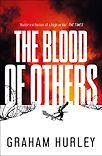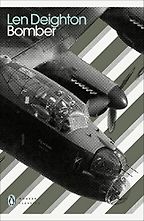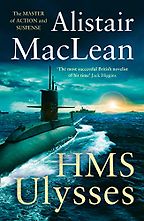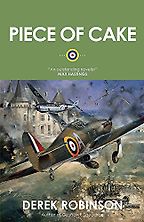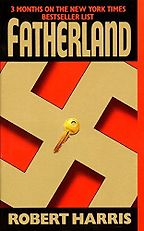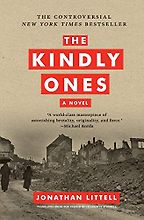Before we get to the thrillers you’ve recommended, why do you think we remain so fascinated by World War Two?
I’ve often asked myself that question. I was born just after the war. My dad had fought in that war, as most dads had. He’d been in the RAF and had quite an exciting time. That was evident to me, even as a child, and in fact it was the period of his life that he most treasured when he got older. My mum had been in London under the bombing, and she’d spent many nights in various shelters. I know a lot about wars from my years as a maker of TV documentaries. Wars are horrible. However, what is incontestable is that things happen to people in wars.
We didn’t have a TV. I used to haunt the Clacton-on-Sea library, and I’d come back every weekend with armfuls of books. Most of those books had emerged from the Second World War, and they began to fuel my appetite for reading about it. When I became a writer, I belatedly recognised that this war and the fact that things happen to people—these are plot-led thrillers—became all important.
So that holds true for people my age. The question is why that fascination has been sustained. My writing career took a long detour into crime fiction. I wrote 16 crime fiction books. It occurred to me, as I wrestled with my agent and tried to find a new publisher for a change of genre direction, that the Second World War had been the biggest crime scene ever. If you look at it in those terms, there’s limitless scope—if you’ve got the curiosity and the right mentality—to go in whichever direction you want. That holds true as a reader, and as a watcher of TV series or movies.
I know you do a lot of research for your books. How important to you is historical accuracy? What’s the interaction between fact and fiction in a good World War II thriller?
Writing fiction is an act of trespass. As a writer, you owe it to your fictional characters, wherever they may have come from, however old or young they may be, to try and get them right. To try and get the small details, the nuance, the body language, the background right. When you’re writing in a genre where you’re dealing with a mix of real people, real events, real chronology, and invented characters, you’ve got to get the facts right and somehow come up with a marriage of the smallest details that’s going to leave the reader turning the pages.
As a reader, the minute that I hit a wrong note—this can apply to wars or relationships or contemporary politics—a little bell sounds in my head. I think, ‘Hang on. To what degree do I trust this person? Have they made a deliberate error? Or are they too lazy to have done the heavy lifting to get the obvious things right?’ If the answer to that is yes, it makes me wonder why I’d go on, and often I don’t.
Let’s talk about the World War II thrillers you’ve chosen. First up is Bomber by Len Deighton, which was published in 1970. It’s about a fictional RAF bombing raid on the night of June 31, 1943. Tell me why you picked it and what’s so good about it.
I’ve chosen these five books for reasons that link to my own journey as a writer. I went to Cambridge to read English and I started writing for two publications. One was Granta, which was then a magazine, and the other one was Varsity, which was the university newspaper. If you were any good, they sent you off on assignments.
One of my early assignments was to go down to Brighton to interview Len Deighton. I was a huge fan of Len Deighton as a thriller writer and spy novelist. I thought he was a brilliant read, and I thought his background research was impeccable. I admired the way he could make the language dance on the page. I was to meet him at his hotel and then, in the afternoon, go out to the Downs where they were shooting Oh! What a Lovely War.
He was the most self-effacing, generous person. He gave me lots of time. He bought me lunch, which was a treat for a penniless student. On set, we inspected the trenches they had dug in the chalk downs on top of the cliffs. It was a memorable afternoon. I wrote the piece, and he liked it (or he was gracious enough to say that he liked it) and it went down well. I became even more of a Len Deighton fan.
Bomber was published in 1970 and was relatively late in his oeuvre. It’s a big book. I have a fixation with various aspects of the Second World War and in my head, of all the guys who did genuinely heroic stuff, bomber crews were way up there, towards the top. They conducted this strange life of going out, often two or three times a week, and courting near-certain death. A typical tour was 30 trips, and it was unusual to finish that. They knew what was lying in wait for them. To survive against those odds, and to keep on doing it, to come back to eggs and bacon and clean sheets, must have been a weird life.
“55,000 aircrew died during the war”
I leapt on Bomber and I devoured it. It was a departure for Len Deighton, because it had taken a year and a half for him to research. That’s his account and I believe him. It’s painstaking in terms of its detail. To my mind, he smuggles a weight of narrative detail into dialogue, which can be a bit of a challenge. Sometimes it’s successful; sometimes it’s not. What’s incontestable is that this fictitious bombing raid is invented for the night of the 31st of June 1943, and the events are narrated from multiple points of view. It’s a hugely ambitious novel.
It has lots of key characters. There’s the plane itself, a Lancaster. It’s called O for Orange, nicknamed the Creaking Door. It has a crew of seven. It’s under the command of a 25-year-old captain whose name is Sam Lambert. He’s married to the lovely Ruth. Once dusk falls and he’s in the dark over Germany, he’s going to be at the mercy of the Luftwaffe night fighters. He’s going to try to dodge, to fox, to fool the Luftwaffe Fighter Command station, which is on the Dutch coast. Welcome to the world of Oberleutnant Victor von Löwenherz in his Junkers 88.
Each of the points of the narrative throws up subplots, in terms of wives, kids, mistresses, and emotional complications. The plane doesn’t take off until halfway through the book. It’s driven on (as your life would be, if you were part of that crew) by this remorseless determination to join the bomber stream; to evade, if possible, the attentions of the gunners and the night fighters; to plant your bombs as close as possible. In the dark, with the kind of rudimentary bomb aiming gear that they had, that was incredibly difficult to do, as well as bad news for the people underneath, many of whom were in villages short of the target. They were the ones who tended to get woken up at night by a very large bang. Len Deighton, at the controls of this book, did incredible justice to all of that.
It’s quite a cold book, and it has an unhappy ending, as so many of these trips did, from the point of view of the Bomber Command men in the Lancasters, the men in Junkers 88s, and the people beneath the so-called bombing point.
I applaud this book. It doesn’t have the warmth that many of his earlier books have, but it is an outstanding achievement.
On those bombing raids to Germany, I thought the fatality rate was about 50 or 60 percent. Are you saying that over the course of 30 trips, it was closer to 100 percent?
The key statistic is around an 8 percent chance of surviving 30 trips intact. You might come back wounded; much more likely, you would be dead or taken prisoner. It is a horrifying statistic to go to bed with at night.
My mum’s cousin was one of them. He died somewhere over the Netherlands. As you were saying at the beginning, we’re all touched by this in some way, aren’t we?
I think we are. And the real bitterness for the men, who took the risk of flying and dying or sometimes surviving, was what happened to them after the war. 55,000 aircrew died during the war. That’s a lot of men, a quantum illustration of the risks that they ran. Yet they never received the recognition that was awarded to the Navy, the Submariners, the Royal Marines, or the Combined Operations Headquarters staff in terms of the collective war effort.
The men from Bomber Command were neglected. That was because they were led by a man called Arthur Harris, known as ‘Butch’ or ‘Bomber’ Harris. He was incredibly focused and effective. He was a hard man. He did his best to protect his men, but he was going to lay waste to German city after German city, and that produced footage towards the end of the war that, once the war was over, horrified large parts of the rest of the world. ‘Look what the Brits have done. Look what Bomber Command has done!’
It was partly because it was the only option. If you’re bombing at night, it’s bound to be imprecise. Americans bombed by day and had a different kind of bombsight, so they were much more accurate. Plus they had a screen of fighters, P-51 Mustangs.
If you put yourself in the head of any member of a bomber crew surviving by the end of the war, you can share that sense of being abandoned, having risked your life night after night, year after year. That would have made anyone extremely bitter.
Let’s go on to HMS Ulysses by Alistair MacLean.
This was published in 1955. It mattered to little me because I was in the period of falling in love with reading. One of the first books I laid my hands on, having taken the step up from the junior library to the senior library, was this book, HMS Ulysses. One look at the cover, one read of the first page, and you knew exactly what it was about.
The HMS Ulysses was a light cruiser, one of the warships on the Arctic run that went from Scapa Flow in the Orkneys (way off the top of Scotland) via Norway and around the North Cape to Murmansk. These were incredibly risky and horrible journeys, with the odds that you would come to grief. We lost over 100 ships on those Arctic convoys.
In the winter, when the weather was at its worst, you’re talking temperatures of minus 20 degrees. There is constant snow, everything is icy, your mug of coffee would stay hot for about six seconds. The boat is being flung everywhere. It weighs 7000 tonnes, but it makes no difference because the waves are enormous. On top of that, the enemy (U-boats, and bombing raids from Luftwaffe airfields in Norway) is trying to kill you. There are endless reasons why you’re not very happy.
I realised, as anyone reading this book will realise, that it’s an essay in exhaustion. The book starts off with a mutiny. The men are knackered, and they have had enough. The Vice Admiral, known as Farmer Giles, has made a series of terrible decisions and suffered a mental breakdown. The captain, whose name is Richard Vallery, has tuberculosis. He’s a sick man, but he’s ultra-loyal to his ship and his crew and is determined to get them through it. This is a key convoy, and he’s there to protect it.
“We lost over 100 ships on those Arctic convoys”
Alistair MacLean had served on these convoys. He’d been a wireless and torpedo operator as a seventeen-year-old, so he had hands-on experience of what it was like. That’s key. Len Deighton did his best to become a bomber pilot, and people say that if you read Bomber, you’ll discover how to fly a Lancaster. But he was far too young to have fought in the war. MacLean wasn’t. He had been through it. As a result, for me as a young reader, every page, every paragraph, every exchange of dialogue had an authenticity you can’t miss. I read it time and time again and thought, ‘Can things have been that bleak, that desperate, that testing, and how did those guys ever come through?’
I don’t want to give you any spoilers, but the fact is that most of them don’t. The novel has an enormous cast of characters, and the characters by and large are the ship’s company. They are young, old, experienced, inexperienced, novice. Together, they have to man up and fight the enemy, not just on this trip, not just on the trip before, but on the trip to come, assuming they make it to Murmansk. Do they get there? You’ll have to read the book.
I read this book as an eleven-year-old. I’ve got an eleven-year-old grandson and I gave him HMS Ulysses last year for his birthday. To my delight, he devoured it in ten days. You asked about writers who don’t do their homework and whether the reader notices. Even when you’re eleven you can smell the real thing, and by God, this was the real thing.
Why were they going to Murmansk?
The Germans were partners with the Russians after the non-aggression pact of 1939. Hitler honoured that pact for less than two years: in June 1941, he invaded the Soviet Union. That was a blessing for us because it was someone else doing the fighting and the dying. That sounds cynical, but it was important. It is one of history’s ironies that the Communists became the capitalists’ best chance of surviving the war and beating the Nazis. The Soviets could only do that with a lot of material help. Much of that help came from the United States via Britain. It was Britain’s job to get the tanks, the Spitfires, the Hurricanes, the fuel, the ammunition, and the food, to Murmansk. Then, it all went south into Russia by rail. That is why those convoys—and they cost an arm and a leg, in terms of men and shipping—were so important. We had to put money on the table to keep the Soviets fighting our mutual enemy.
Let’s move on to the next World War II thriller you’re recommending, Piece of Cake by Derek Robinson, which was published in 1983 and takes us back to the RAF.
I read this book as soon as it came out. It was the first of a number of revisionist takes on the RAF’s performance in the early years of the war. It’s set in the period between 1939 and 1940, and the Phoney War (French: drôle de guerre). We were sorely unprepared for it. Above all, the RAF was sorely unprepared for it.
The novel casts a fairly jaundiced eye upon what happened to the men in Hornet Squadron. They’ve been shipped out to northern France. In the book’s opening pages, Squadron Leader Ramsey lands his Hurricane after a trial flight in broad daylight and ends up nose down in the slit-trench. He tries to get out of the cockpit, falls, breaks his neck, and dies. He’s replaced by a New Zealander called Squadron Leader ‘Fanny’ Barton. Within a couple of weeks, he shoots down what he takes to be a two-engine enemy aircraft and realises rather late in the day that it’s a Blenheim, one of our own. Yet another commander arrives in the form of Squadron Leader Rex, who’s upper-class. Now the squadron is living in luxury: great food, lovely views, clean sheets, and four-poster beds in a French chateau near the airfield.
The rest of the book takes us into the business of trying to stay alive. When you lack experience, the right kind of aircraft, and you are at the mercy of the world’s best air force, the Luftwaffe, terrible things happen. Often there’s a degree of black humour in it.
One of the things that sent me to the book was reading an early review in the Times. The reviewer was outraged because this was a book that said, ‘Hang on. This isn’t a story of the few and the brave, of heroism and so forth. It pertains to real life.’ Again, the key word is authenticity. Derek Robinson hadn’t been in the war, but he did a lot of research. He’s also a bloody good writer. I love this book. I think it’s great.
You’re also bringing out the more tragic, non-heroic side of World War II in your latest book, The Blood of Others. It’s about the 1942 Dieppe Raid (aka Operation Jubilee) and it’s horrifying, what happened. Lord Mountbatten comes across very badly indeed.
If you’re dealing with real people, and Mountbatten is a very good example, then you owe it to them to try and climb inside their heads and their hearts, and figure out every detail. Often I start with body language. You can get a lot of this from the wartime black and white film archive, particularly the German archive, because they’ve got lots of it and it’s of good quality. You can get a fix on people like Hitler, Goebbels, Himmler, and so on. Mountbatten was the first time I dealt with anyone with his connections. I read a couple of books about him. When I worked in television, I shared an office with a relative of his, so I knew the world he came from.
I wouldn’t dream of putting the first paragraph down until I’ve read at least forty books and highlighted the bits that matter and stripped out those half-line references that I can sprinkle over the narrative to give it authenticity—the smell and taste of that period. All that takes a long time.
I got to grips with how and why the 1942 raid took shape. It served all kinds of purposes, not least of which was fending off the Russians forever saying, ‘You’ve got to get into Europe. You’ve got to open the second front.’ There was a big Second Front Now movement, with vast rallies across the country from 1942 onwards, but we didn’t have the manpower or the boats. We couldn’t mount D-Day overnight. We had to keep the Russians quiet, and it was Mountbatten’s job to do that.
I also came across Noël Coward, and In Which We Serve, and there are passages about that in the book.
Over the eight books that comprise the Spoils of War collection, I love pushing the narrative on, through passages of dialogue, meetings, and encounters (often under pressure) between real people and my fictional characters. As I keep saying, you’ve got to get the real people right. In this book, I’m dealing with the Germans, the French (obliquely) and, above all, the Brits in London.
I realised at the end that this raid should never have happened. The Germans knew about it. It had been discovered in its former incarnation (not as Operation Jubilee but as Operation Rutter) by the Luftwaffe. They’d spotted the invasion fleet off the Isle of Wight, bombed the key ferries, and gone home. There was only one tidal chance left the following month. They thought that even the Brits wouldn’t be silly enough to have a second go.
What they’d underestimated was the command chain. Churchill had left the country and was en route to Moscow for his first meeting with Stalin. Montgomery, who had been associated with the Dieppe raid, had gone to the Middle East to replace Auchinleck. There was no one in charge and it was Mountbatten who took the decision to remount the expedition, in the belief that split-second timing would land those 6,000 Canadians on the beach at the right time to storm the defences, kill lots of Germans, create havoc inland, and then stage a dignified and successful retreat. None of that happened, for the reasons you’ll discover if you read the book.
What was equally shocking was the cover-up afterwards. The strapline that goes with the publicity for the novel is: ‘A catastrophe no headline dared admit.’ And that’s true. History was rewritten. The government—above all, Churchill—took steps to recast what had been a disaster. Other people’s blood, Canadian blood, was spilt on a recce-in-force, a rehearsal, for a coming moment when, on a much larger scale, we would set foot on a different set of invasion beaches—which turned out to be in Normandy—and set in motion the set of events that would end the war.
We’d better get on to the next book, Fatherland. I’m a big Robert Harris fan, though I don’t remember this one very clearly.
I’m a huge Robert Harris fan as well. I’ve loved most of his books. The most recent one, Act of Oblivion, is brilliant. V2 and Munich are not so great, but a lot of his stuff is fantastic.
Fatherland’s central conceit is that it takes place in Hitler’s Berlin in 1964. Hitler is 75. The 20th of April, the Fuhrer’s birthday, which is a big national celebration, is fast approaching. The novel is cast as a thriller, which is a very clever decision on Robert Harris’s part. It starts off with a body in the Havel, near a favoured island in Berlin called Schwanenwerder. It’s the body of a man called Josef Bühler. Another body is found—of Wilhelm Stuckart. The facts of these two deaths are investigated by a lone detective called Xavier March, who works for the Berlin Kriminalpolizei (Kripo). He identifies a possible third target, who’s still alive, a guy that Robert Harris has playfully named Martin Luther.
In the opening and middle stages of the investigation, the murders appear to be connected with a giant theft. During looting of Poland in 1939, where all three of these men were at the beginning of the war, they lifted vast quantities of fine art and gold. That turns out to be a red herring. In fact, there’s a much bigger secret that lies beyond it.
It’s a good tale well told. As ever, his background research is brilliant. What worked, above all, for me is the way he inserts, en passant, little gems of the way things are. What happened to Churchill? What happened to the British royal family? They’re all in Canada. What happened to the Russians? The Russians have been pushed back east of the Urals. There’s still a guerrilla war going on. It’s being funded by the Americans and offers no real challenge to the Germans, who are settling into the Greater German Reich. In vast areas of the Ukraine, Germans are growing crops. America is under President Kennedy, but it’s not Jack Kennedy, it’s Joe Kennedy, who was ambassador to London, the great appeaser. The ambassador to Berlin is no other than Charles Lindbergh.
Because it’s the 75th anniversary of Hitler’s birthday, there’s a celebratory concert in London, at the Royal Albert Hall, conducted by Herbert von Karajan. There’s a playful reference to a bunch of howling Liverpudlians in a Hamburg cellar who are called the Beatles, taking the city by storm.
Five Books interviews are expensive to produce. If you're enjoying this interview, please support us by donating a small amount.
The background is really enticing, and the big driver of the plot is the investigation, where it leads, and what it means. There’s a bit of a problem towards the end of the investigation, but I’d be giving the plot away, so I won’t go there. It’s a very ambitious book but it’s very lightly done, and that’s the mark, in my world, of a superb writer.
The last book you’re recommending is The Kindly Ones. This is a fictional memoir, I believe.
I came across this after I’d drawn up my list of five books for you. I thought, ‘I’ve got to read this.’ I didn’t know it’s nearly 1,000 pages long. It’s written by Jonathan Littell, who grew up in Paris although he’s American. It was written in French, and its original title is Les Bienveillantes (‘the welcoming ones’). I think the title in English is probably the worst title I’ve ever come across in my life. However, this book has knocked everything else I’ve ever read about the Second World War out of the park. It is just incredible.
He strings together the darkest pools of darkness in that period of history from 1941 through 1945. The first atrocity is the massacre at Babi Yar, which happened just outside Kyiv in September 1941. In two days, the Germans murdered 33,000 Jews as a reprisal for compliance with the Russians, who’d left bombs all over Kyiv. I’ve written a book about that event. My wife and I have been to Kyiv, and we visited Babi Yar. I’ve read about Babi Yar, but I’ve never read anything as explicit and detailed as this.
Jonathan Littell’s stroke of genius is inventing, as his central character, an SS Hauptsturmführer called Dr. Maximilien Aue. A middle-ranking and bureaucratically gifted manager, he’s assigned by the SS to keep tabs on what’s happening in Russia as the Wehrmacht pushes on and making sure the job is well done as the Einsatzgruppen move from village to town to city killing Jews and gypsies and intellectuals in their thousands.
He then falls out with his bosses and ends up in Stalingrad. That battle took place between October 1942 and February 1943. I’ve written a book called Last Flight to Stalingrad, so I’ve read endless books about Stalingrad. I know the background, I know the voices, I know the taste and the smell. I thought I’d nailed it completely, and so do lots of reviewers, but then I read Littell. Mon Dieu.
Aue also goes to Auschwitz. He’s assigned to various death camps to make sure they’re doing it right. He ends up on the death march west. The Germans have lost the war. The Russians are advancing, and revenge is in the air. They’re running out of everything. They’re running out of rolling stock, in terms of the railways; they’re running out of fuel, in terms of the Luftwaffe and the tanks. It’s the bleakest possible outlook. He ends up, as most of them did, a refugee in what’s left of Berlin. I’ve written a book called Katastrophe about Berlin in 1945, and again I can only shake my head in admiration at his take on that ruined city.
You’ve got to have a strong stomach to read this stuff. He’s a good writer. He’s far too young to have fought in the war but he’s done his research. The book is obscene, for all kinds of reasons, but he doesn’t blink in the face of extreme horror. For what I would describe as our best interests, he takes us there.
He makes it authentic. After reading all these books—40 books for one of mine, so that’s nearly 300 books—I began to realise how the whole thing holds together. Because he goes into such minute detail over 974 pages, I began to sense the way it really was and felt and tasted. It was an astonishing book to read.
Do you have any nonfiction books about World War Two that you particularly like?
There are two answers to that. The first is a book called First Light by Geoffrey Wellum. He was a Spitfire pilot. He happened to go to the same school I went to. It’s beautifully written. It’s about being a Spitfire pilot over that long, hot summer of 1940. I found it compelling. And—this is another doffing of my authorial cap to Mr. Littell—The Kindly Ones reads like a nonfiction book, and that to me is a brilliant achievement.
“The Blood of Others” by Graham Hurley is published by Head of Zeus on July 6th, 2023 at £20
Five Books aims to keep its book recommendations and interviews up to date. If you are the interviewee and would like to update your choice of books (or even just what you say about them) please email us at [email protected]

